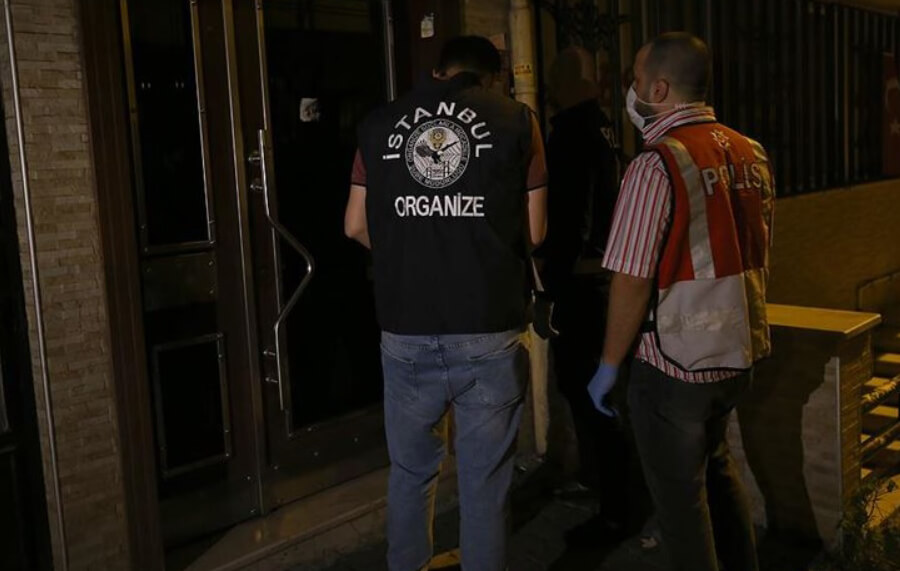Turkish social media users have expressed outrage over the detention of nine people, including former military cadets, in the Muslim holy month of Ramadan over their alleged links to the Gülen movement, the Kronos news website reported on Tuesday.
The detentions, which came in the early hours of Tuesday during Muslims’ pre-fasting mealtime (sahur) in Ramadan, were conducted as part of an İstanbul-based operation carried out in three provinces and after prosecutors issued detention warrants for 13 people, including nine former military cadets.
The accusations leveled against the suspects include secretly communicating with their contacts within the movement via payphones.
The so-called “payphone investigations” are based on call records. The prosecutors assume that a member of the movement used the same payphone to call all his contacts consecutively. Based on that assumption, when an alleged member of the movement is found in call records, it is assumed that other numbers called right before or after that call also belong to people with Gülen links.
According to Kronos, the former cadets, who were filmed during their detention, were asked to act as if they were wearing handcuffs as they leave their apartment building accompanied by police officers.
The detail revealed by Kronos led many to think the operation was carried out arbitrarily so that President Recep Tayyip Erdoğan, who is facing the toughest election in his 20-year rule, could attract more votes.
“I think they are testing [to see] whether there is a relationship between [their] cruelty and [natural] disasters, [and] whether there is divine justice,” Turkish academic and columnist Emre Uslu said, referring to the operation and the ruling Justice and Development Party (AKP) government.
Bence zulüm ile felaketler arasında bir ilişki var mı yok mu diye, ilahi adalet var mı diye test yapıyorlar. Öğrencileri sahurda gözaltına almışlar. #Sahuroperayonu
— Emre Uslu, PhD (@EmreUslu) April 4, 2023
Danish-based Turkish journalist Hasan Cücük also criticized the government in a tweet, saying that it continues its “persecution” even in the holy month of Ramadan by detaining cadets during the time of sahur.
“In the month when the devils are tied, the cruelty of the tyrant doesn’t slow down,” Cücük added, referring to Erdoğan.
Ramazan’da bile zulme devam!
İstanbul’da sahur vakti üniversite öğrencilerine operasyon yapıp gözaltına aldılar.
Şeytanların bağlandığı ayda, zalim zulmünde hız kesmiyor. pic.twitter.com/F6ET8Gw1rG— Hasan Cücük (@HasanCucuk) April 4, 2023
“[The police] shot a video of the sahur operation. They served it to the media. The detainees are cadets. They are children! They don’t have guns in their hands, they have pens!” a Twitter user named Fehmi Acat said, posting a video of the detentions.
#Sahuroperayonu videosu çekmişler.
Medyaya servis etmişler.
Gözaltına alınanlar öğrenci..
Çocuk yani çocuk!!
Ellerinde silah yok, kalem var!!
Korkuları da bu!
Cehalet ve zulüm tayfası kalemden korktuğu kadar hiç bir şeyden korkmadı!!! pic.twitter.com/JAMgMCrYqW— Fehmi ACAT (Yeni) (@fehmiacat47) April 4, 2023
10 people detained in Ankara over alleged links to Gülen movement
Meanwhile, 10 people were also detained in Ankara after the Ankara Chief Public Prosecutor’s Office issued detention warrants for 17 suspects, some of whom were accused of using ByLock.
Once widely available online, ByLock has been considered a secret tool of communication among supporters of the faith-based Gülen movement since a coup attempt on July 15, 2016, despite the lack of any evidence that ByLock messages were related to the abortive putsch.
The detentions come despite a 2021 ruling from the European Court of Human Rights (ECtHR) that found the use of ByLock not to constitute a criminal offense.
Turkish President Erdoğan has been targeting followers of the Gülen movement, inspired by Turkish Muslim cleric Fethullah Gülen, since the corruption investigations of Dec. 17-25, 2013, which implicated then-prime minister Erdoğan, his family members and his inner circle.
Dismissing the investigations as a Gülenist coup and conspiracy against his government, Erdoğan designated the movement as a terrorist organization and began to target its members. He intensified the crackdown on the movement following the abortive putsch in July 2016 that he accused Gülen of masterminding. Gülen and the movement strongly deny involvement in the coup attempt or any terrorist activity.
Following the failed coup, the Turkish government declared a state of emergency and carried out a massive purge of state institutions under the pretext of an anti-coup fight. More than 130,000 public servants were summarily removed from their jobs for alleged membership in or relationships with “terrorist organizations” by emergency decree-laws subject to neither judicial nor parliamentary scrutiny.
In addition to the thousands who were jailed, scores of other Gülen movement followers had to flee Turkey to avoid the government crackdown.
